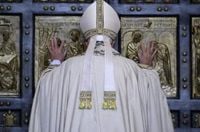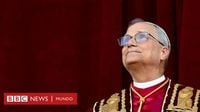On May 8, 2025, the Catholic Church welcomed a new leader as the smoke from the Sistine Chapel signaled the election of Cardinal Robert Prevost as Pope Leo XIV, following the death of Pope Francis I. The announcement came after a swift conclave, which saw 133 cardinals gather to deliberate and ultimately select the 267th pontiff.
The conclave commenced on May 7 with a solemn mass at St. Peter's Basilica, where the cardinals gathered to pray for guidance. The atmosphere was charged with anticipation as they moved to the Pauline Chapel for further prayers before entering the Sistine Chapel, where they would cast their votes under strict confidentiality. The conclave was presided over by Pietro Parolin, the oldest of the Order of Bishops.
After four rounds of voting, the white smoke emerged from the Vatican chimney at 18:08, a clear indication that a new pope had been chosen. The moment was met with cheers from the thousands gathered in St. Peter's Square, eager to hear the identity of their new leader.
Cardinal Prevost, 69, made history as the first American pope and was recognized not only for his nationality but also for his deep roots in Latin America, having spent nearly two decades working as a missionary and bishop in Peru. In his first public address, he surprised many by delivering part of his speech in Spanish, expressing gratitude for his predecessor and calling for unity among the faithful.
“The weak but always courageous voice of Pope Francis still echoes in our ears,” Prevost said, urging the congregation to move forward together in faith. He emphasized the need for a synodal church that is both welcoming and missionary, aiming to build bridges of dialogue and understanding.
Born in Chicago on September 14, 1955, Prevost was raised in a family with a Spanish mother and an American father. His early education took place in the Minor Seminary of the Augustinian Fathers in Chicago, followed by studies at Villanova University, where he earned a degree in Mathematics. At 22, he entered the novitiate of the Order of Saint Augustine and later pursued a doctorate in Canon Law in Rome.
Prevost was ordained a priest in 1982 and was sent to Peru just three years later, where he became deeply involved in the local church and community. His pastoral work in Peru included roles as a parish priest, seminary teacher, and eventually as the bishop of Chiclayo, where he was known for his commitment to social justice and his outreach to marginalized communities, including Venezuelan migrants.
His election as pope comes at a time when the Catholic Church faces significant challenges, including internal divisions and the ongoing fallout from sexual abuse scandals. Prevost’s moderate stance positions him as a potential bridge between conservative and reformist factions within the church. His close relationship with Pope Francis, who appointed him as prefect of the Dicastery for Bishops in 2023, suggests a continuity of the reforms initiated by his predecessor.
In his first speech, Prevost also acknowledged the need for transparency and support for abuse victims, reflecting the church's urgent need to address these issues head-on. “We must be transparent and accompany the victims,” he stated, signaling his commitment to tackling the church's past failures.
The election of Prevost has garnered international attention, with leaders from around the world expressing their congratulations. U.S. President Donald Trump highlighted the significance of having an American pope, stating, “Congratulations to Cardinal Robert Francis Prevost, newly appointed Pope. What a great honor for our country!” Meanwhile, Spanish Prime Minister Pedro Sánchez expressed hope that Prevost’s papacy would strengthen dialogue and human rights advocacy globally.
Prevost’s journey to the papacy is remarkable, especially considering his relatively low profile prior to his appointment as prefect. He has been described as a humble and approachable leader, qualities that resonate with many within the church and beyond. His election reflects a broader trend of the Catholic Church seeking leaders who are not only spiritually grounded but also socially aware.
As Pope Leo XIV, Prevost now faces the monumental task of guiding the Catholic Church through a complex landscape marked by both challenges and opportunities. His leadership style, shaped by his experiences in Peru and his commitment to social justice, will likely influence the direction of the church in the coming years.
The world watches closely as Pope Leo XIV begins his papacy, hopeful for a renewed focus on inclusivity, dialogue, and service to the marginalized. The legacy of Pope Francis looms large, and many are eager to see how Prevost will carry forward the mantle of leadership in a time of great need.


